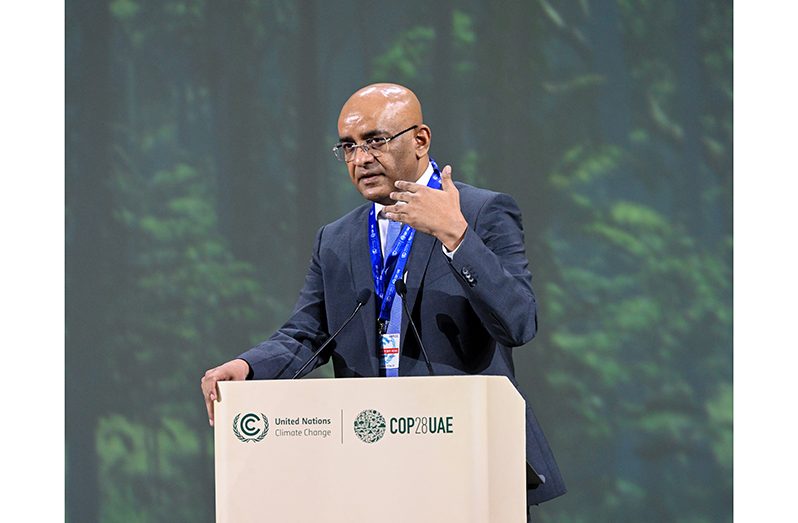Guyana to continue forest preservation, carbon credits sale in voluntary market- VP Jagdeo
ALTHOUGH world leaders did not arrive at a consensus to establish a market-based mechanism for forestry preservation, Guyana will continue its work to preserve its standing forests and secure financing to do same through the sale of carbon credits in a voluntary market.
At a press conference last week, following the conclusion of the 28th Conference of Parties to the United Nations Framework Convention on Climate Change (COP28), Vice-President, Dr. Bharrat Jagdeo maintained that Guyana will continue its work to preserve its standing forests.
He noted that while Guyana has entered a voluntary market which will see the country raising US$750 million for preserving its forests, a structured mechanism could create a ‘greater incentive’ for Guyana and other developing countries.
At a minimum, Guyana could earn US$2.5 billion more in the next 10 years. Guyana had hoped to champion the cause for the establishment of market-based mechanisms to promote forest conservation.
For those who may not know, the voluntary carbon market gives companies, non-profit organisations, governments, and individuals the opportunity to buy and sell carbon offset credits. A carbon offset is an instrument that represents the reduction of one metric tonne of carbon dioxide or greenhouse gases or emissions.
“We will continue doing our work in the voluntary market …but right now you have no compliance market. I am very saddened because you have some really great practices in a lot of countries, particularly in Africa.”
“We thought that advancing the carbon markets will create greater incentives for countries that are forested to ensure that they can raise money through the market mechanism to out compete alternate use and therefore preserve their forests without taking away the forest as a development tool in the arsenal of these countries. People live in the forest; they earn from the forest. The forests are not museum pieces for anybody in the northern part [of] our world and we had a setback on that,” Dr. Jagdeo added.
Guyana recently earned US$750 million for protecting its forest in its first sale in the voluntary market.
The government was recently able to certify the entire forest at the jurisdictional scale through the Architecture for REDD+ Transactions (ART).
This paved the way for a historic agreement between Hess Corporation and the Government of Guyana, whereby the oil giant opted to purchase about one-third of all Guyana’s credit (issued and anticipated) up to 2030.
The country’s forests store 19.6 gigatonnes of carbon dioxide.
“We managed to get our entire forest certified, credits were issued, and we traded 30 per cent of those credits for US750 million,” he reiterated.
Already Guyana has received its first payment of US$75 million from its first sale and 15 per cent of this has been allocated to indigenous communities across the country for various community projects, while the remaining 85 per cent will be used for climate adaptation.
“500 projects, 15 per cent already went to indigenous communities, 85 per cent is just sitting there in an account from the first release… $122. 5 million sitting in an account now to be spent on adaptation measures to keep our country safer from the sea rise, or from undue rainfall.”



.jpg)








